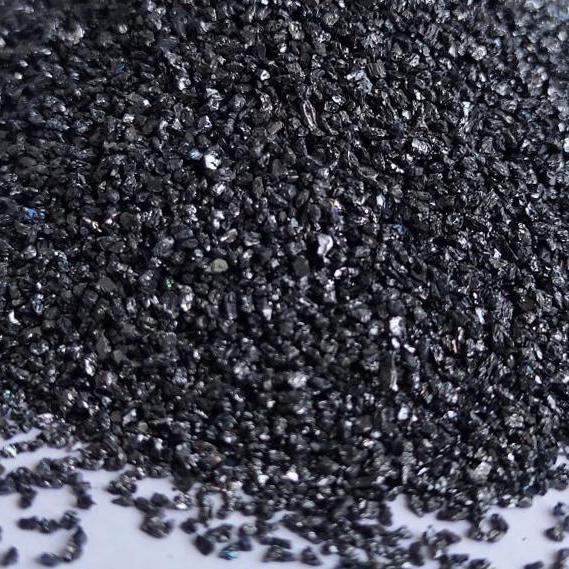Black Silicon Carbide (SiC) is an important abrasive material that is widely used in various industrial fields due to its excellent physical and chemical properties. As a high-hardness material, black silicon carbide not only occupies an important position in the abrasives industry, but also plays an indispensable role in the fields of refractory materials, ceramics, and electronic devices.

Physical and chemical properties
Black silicon carbide has the following significant characteristics:
High Hardness: Black silicon carbide has a Mohs hardness of about 9.2, second only to diamond, making it an extremely effective abrasive. Its high hardness allows it to grind a variety of metallic and non-metallic materials with ease.
Thermal stability: Black silicon carbide shows good stability at high temperatures, with a melting point as high as approximately 2700°C, which allows it to maintain its physical properties in high temperature environments.
Corrosion Resistance: Black silicon carbide has good resistance to most acids and bases, making it very popular in the chemical processing industry.
Thermal Conductivity: Black silicon carbide has a high thermal conductivity, making it excellent in applications that require rapid heat dissipation.
Low expansion coefficient: Its low linear expansion coefficient makes black silicon carbide less likely to deform when temperature changes, making it suitable for precision machining.
Preparation method
Black silicon carbide is usually produced by the electric arc furnace method. The process involves reacting high-purity quartz sand with petroleum coke at high temperatures to produce SiC. During the production process, by controlling the purity of raw materials and reaction conditions, black silicon carbide abrasives with different particle sizes and purity levels can be obtained.
Application areas
Abrasives industry: Black silicon carbide is an important raw material for manufacturing sandpaper, abrasives, cutting tools, etc. Due to its sharp particle shape, it can effectively remove irregularities on the material surface and provide a high-quality surface finish.
Ceramics and Refractories: In the ceramic industry, black silicon carbide is used as an additive to improve the wear resistance and strength of ceramic products. In refractory materials, it is also widely used to enhance the heat resistance of products.
Electronics industry: Due to its excellent thermal conductivity and electrical insulation, black silicon carbide is used to manufacture semiconductor devices and other electronic components. In power electronics, it increases efficiency and reduces energy losses.
Construction and stone processing: In the construction industry, black silicon carbide is used to cut and polish stone, concrete and other materials. It can handle hard materials quickly and effectively, improving construction efficiency.
Sandblasting and surface treatment: As a sandblasting medium, black silicon carbide can remove oxides, rust and other impurities on the metal surface, providing a good foundation for subsequent painting or treatment.
competitive advantage
Black silicon carbide has higher hardness and better cutting properties than other abrasives, such as aluminum oxide or zirconium oxide. This makes it the material of choice in many applications. In addition, due to the controllability of its production process, products of different particle sizes and purity levels can be provided according to customer needs to meet specific application needs.
in conclusion
As a high-performance abrasive, black silicon carbide has shown wide application potential in many fields due to its excellent physical and chemical properties. From the abrasives industry to electronics manufacturing to construction and surface treatment, its importance cannot be ignored. As technology develops and market demands continue to change, black silicon carbide will continue to play a greater role in various industries.
